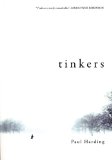
Tinkers is a small book, flush with long sentences; a novel of spare
plot, but grand and intricate ideas. It deserved my full reading
attention, and as a result it served as a kind of antidote to the fast-paced
skimming sort of reading that I perform each day via the computer screen.
On the surface Tinkers, Paul Harding's first book, is the tale of
an average man's final days. George Crosby, surrounded by loving family in the
home that he built, is experiencing the last hours of life and memory as his
body methodically fails him. The ministrations of George's relatives and wife
fade from his consciousness as the hours pass and he is transported to places
from his past as he re-lives vital pieces of his life, most often meditating on
his stark and anxious childhood in West Cove, Maine. These childhood scenes
focus sharply on George's stifled remembrances of his epileptic father, Harold,
who disappeared from the family while George was still a youth. George's
knowledge of his father is truncated, but the reader is privileged to be shown
Harold's life beyond this departure and to discover that Harold and George are
still connected, though not physically or even consciously, as father and son.
Being privy to the interior thoughts of both George and Harold made me feel
intimately acquainted with them. I found myself reflecting on their lives and
accomplishments as if they were real. Both men are prone to flights of fancy:
Harold's are most vivid before a seizure and George's becoming stronger as he
grows closer to death. Many of these fantastical musings are rooted in the
natural world. The mysteries of nature seem to echo, or perhaps refocus,
questions both men harbor about their fathers and the meaning of their brief
lives.
 The author's fondness for paragraph-long sentences and stretched-out streams of
interconnected, yet separate, observations demand concentrated periods of
reading. The compact subject matter also encourages extended reading sessions:
if I tried to read a few pages of Tinkers between other activities, I
found that the journey on which I was accompanying George was fragmented and the
narrative's mood and momentum were broken. As I slowed my racing mind, the
juxtaposition of utter realism and surreal imaginations worked beautifully
together, creating a remarkable, unified story.
The author's fondness for paragraph-long sentences and stretched-out streams of
interconnected, yet separate, observations demand concentrated periods of
reading. The compact subject matter also encourages extended reading sessions:
if I tried to read a few pages of Tinkers between other activities, I
found that the journey on which I was accompanying George was fragmented and the
narrative's mood and momentum were broken. As I slowed my racing mind, the
juxtaposition of utter realism and surreal imaginations worked beautifully
together, creating a remarkable, unified story.
Tinkers is a skillfully written novel. It succeeds in demonstrating that
our daily, microcosmic lives contain vastness and fantasy. This book offers its
reader a meditation on the private geography of the mind and, through Harding's
characters, a glimpse of our own efforts to piece together the broken and
mismatched elements of human relationships and existence.
![]() This review was originally published in January 2009, and has been updated for the
January 2009 paperback release.
Click here to go to this issue.
This review was originally published in January 2009, and has been updated for the
January 2009 paperback release.
Click here to go to this issue.
Your guide toexceptional books
BookBrowse seeks out and recommends the best in contemporary fiction and nonfiction—books that not only engage and entertain but also deepen our understanding of ourselves and the world around us.